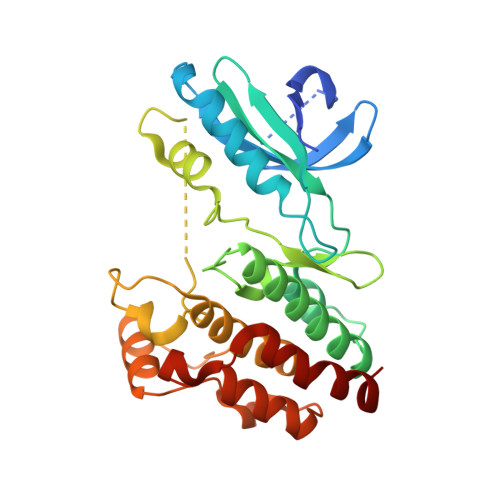RIP1 inhibition blocks inflammatory diseases but not tumor growth or metastases.
Patel, S., Webster, J.D., Varfolomeev, E., Kwon, Y.C., Cheng, J.H., Zhang, J., Dugger, D.L., Wickliffe, K.E., Maltzman, A., Sujatha-Bhaskar, S., Bir Kohli, P., Ramaswamy, S., Deshmukh, G., Liederer, B.M., Fong, R., Hamilton, G., Lupardus, P., Caplazi, P., Lee, W.P., van Lookeren Campagne, M., Johnson, A., McKenzie, B.S., Junttila, M.R., Newton, K., Vucic, D.(2020) Cell Death Differ 27: 161-175
- PubMed: 31101885
- DOI: https://doi.org/10.1038/s41418-019-0347-0
- Primary Citation of Related Structures:
6NYH - PubMed Abstract:
The kinase RIP1 acts in multiple signaling pathways to regulate inflammatory responses and it can trigger both apoptosis and necroptosis. Its kinase activity has been implicated in a range of inflammatory, neurodegenerative, and oncogenic diseases. Here, we explore the effect of inhibiting RIP1 genetically, using knock-in mice that express catalytically inactive RIP1 D138N, or pharmacologically, using the murine-potent inhibitor GNE684. Inhibition of RIP1 reduced collagen antibody-induced arthritis, and prevented skin inflammation caused by mutation of Sharpin, or colitis caused by deletion of Nemo from intestinal epithelial cells. Conversely, inhibition of RIP1 had no effect on tumor growth or survival in pancreatic tumor models driven by mutant Kras, nor did it reduce lung metastases in a B16 melanoma model. Collectively, our data emphasize a role for the kinase activity of RIP1 in certain inflammatory disease models, but question its relevance to tumor progression and metastases.
- Department of Discovery Chemistry, Genentech, 1 DNA Way, South San Francisco, CA, 94080, USA. patel.snahel@gene.com.
Organizational Affiliation:


















